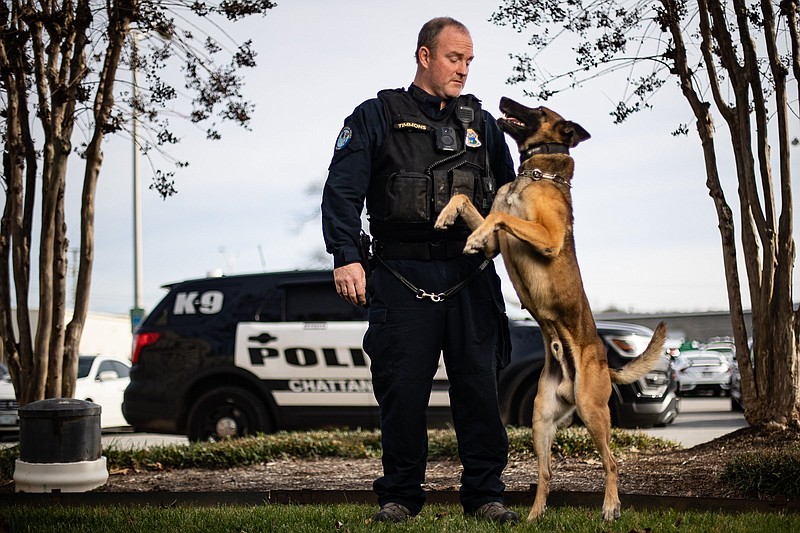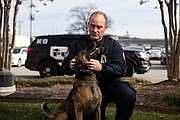Officer Lucas Timmons of the Chattanooga Police Department's K-9 unit, has to educate people about his canine partner, a Belgian Malinois named Burt.
"He's not some mean junkyard dog, he is trained to bite people on command, and he has done that to keep officers safe and citizens safe," said Timmons, who's been with the department for a little over 16 years and part of the K-9 unit for more than a decade. "I like to get the message across that it's not like a chainsaw swinging around at the end of a rope, they're highly motivated and highly trained to do their job."
Timmons and Burt sometimes represent Chattanooga in competitions, most recently the "Detection Dog Challenge" on ESPN2.
"It was a great time. Being in the K-9 unit, obviously you love dogs and you have a lot of common interest, so every time you can get around K-9 handlers especially, you already have so many things in common so you really hit it off with people," Timmons said. "The experience of getting to go inside the arena and compete with my dog with other people from across the country was a really neat experience."
(READ MORE: Meet Gunther, Chattanooga's newest K-9 Officer)
K-9 units are comprised of dogs who are bred to perform specific tasks. Usually the dogs that are part of the unit are high-energy, intelligent and focused breeds such as Belgian Malinois, German shepherd, bloodhounds, Dutch shepherds and Labrador retrievers. Poughkeepsie, New York, recently introduced the first-ever pit bull to join a police unit.
Timmons has had around five different K-9 partners during his career. Burt has been with him for over five years, and he says that time has helped him build confidence and a strong bond when out in the field.
"That's what's really different with him, is having that time. I always tell people that it takes about a year and a half of working that dog on a regular basis to get really good, knowing what to expect from the dog and they know what to expect from you," Timmons said. "We're able to help other officers do their job more safely and better."
Police dogs are trained to do a variety of jobs:
- Apprehension, which is mostly done by herding breeds such as Belgian Malinois, German shepherds and Dutch shepherds because of their physical strength and their natural tendency to protect their handlers.
- Detection, which is mostly done by English springer spaniels, Labrador retrievers, beagles and recently American pit bull terriers.
- Search and rescue, mostly done by golden retrievers, American Labrador retrievers and border collies.
Like humans, working dogs can suffer from post-traumatic stress disorder, especially those who have seen combat. According to the American Kennel Club, symptoms in dogs can include panic, panting, fearfulness, aggression and hyper-reactivity.
Working dogs who experience the disorder will often shut down and refuse to perform their tasks.
Timmons, who has been awarded the 2018 Top Narcotics Team prize and also is an assistant trainer for the K-9 unit, advises that consistency is key when working and training dogs.
"Anything that comes with dog training is fairness and consistency. You have to make sure that the dog knows what to expect from you," Timmons said. "Coming back to my connection with Burt, he knows what to expect of me, and there's some sort of reward from me. You've got to have that consistency and be fair."
(READ MORE: ESPN2 to air national K-9 competition featuring Chattanooga Police Department team)
Contact La Shawn Pagán at lpagan@timesfreepress.com or 423-757-6476. Follow her on Twitter @LaShawnPagan.

